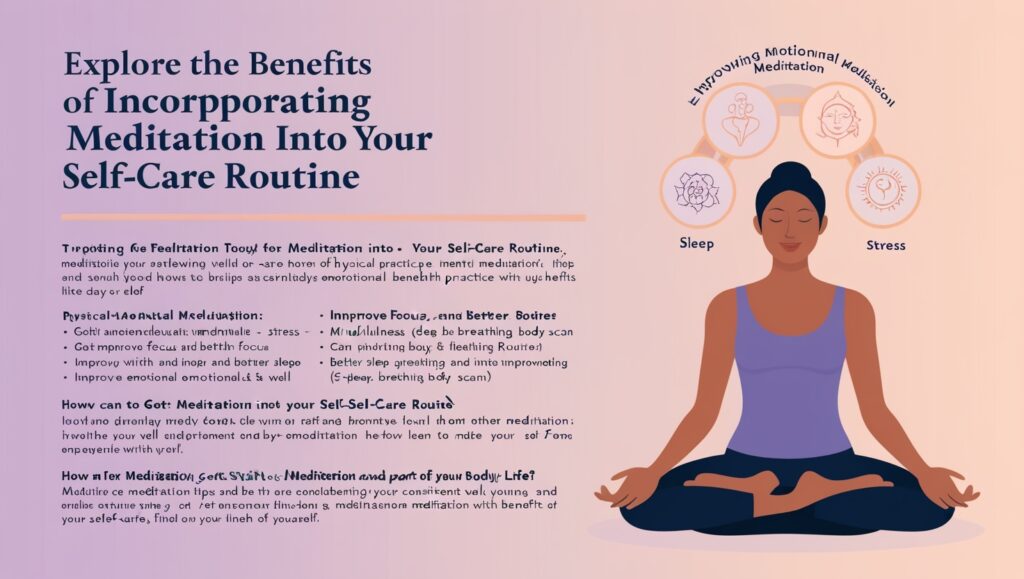Meditation Should Be Part of Your Self Care Routine
In today’s fast-paced world, self-care has become more important than ever. Between juggling work, personal responsibilities, and staying connected with others, many of us are constantly on the go. Amidst all this hustle, we often forget to prioritize our mental and emotional well-being. Meditation Should Be Part of Your Self Care Routine This is where meditation comes in—a simple yet powerful tool that can significantly enhance your self-care routine and help you maintain a balanced, calm, and peaceful state of mind.
The Science Behind Meditation and Self-Care
Meditation isn’t just a trendy activity; it’s rooted in science and has proven benefits for both the mind and body. Studies have shown that regular meditation can lower stress levels, reduce anxiety, improve focus, enhance emotional health, and even boost physical well-being. When you meditate, you allow your body and mind to slow down, giving yourself a chance to recharge and reset.
Meditation as a Stress-Buster
Stress is a natural part of life, but when it becomes chronic, it can have a negative impact on both your mental and physical health. Meditation provides a calming effect by activating the parasympathetic nervous system, which helps your body enter a state of relaxation. By focusing on your breath and being present in the moment, meditation reduces the levels of cortisol (the stress hormone) in your body, promoting a sense of calm and peace.
Incorporating meditation into your daily self-care routine helps you manage stress more effectively, leaving you better equipped to face challenges without feeling overwhelmed.
Emotional Health and Resilience
Self-care isn’t just about physical wellness—it’s also about nurturing your emotional health. Meditation is an excellent tool for fostering emotional well-being. It encourages mindfulness, which helps you become more aware of your thoughts and feelings without judgment. Meditation Should Be Part of Your Self Care Routine By observing your emotions, rather than reacting impulsively to them, you can gain greater emotional resilience.
Additionally, meditation can help you develop a more positive mindset. Regular practice fosters gratitude, compassion, and self-love, all of which contribute to a healthier emotional state. Meditation allows you to clear mental clutter and focus on the things that truly matter, bringing clarity to your life.
Improved Sleep Quality
One of the most significant benefits of meditation is its ability to improve sleep quality. Many people struggle with sleep disorders, insomnia, or restless nights due to anxiety or stress. Meditation, especially techniques like mindfulness meditation or deep breathing exercises, can help quiet the mind and promote relaxation. This makes it easier to fall asleep and stay asleep throughout the night.
When you meditate before bed, you signal to your brain that it’s time to unwind, reducing the racing thoughts that often keep you awake. Over time, meditation can help you establish a peaceful nighttime routine and improve your overall sleep quality.
Enhancing Focus and Clarity
In our busy lives, it’s easy to become distracted, overwhelmed, or scattered. Meditation can be a powerful tool for increasing focus and clarity, making it easier to stay present and productive. Meditation Should Be Part of Your Self Care Routine When you practice mindfulness meditation, you train your brain to concentrate on the present moment, reducing mental clutter and distractions.
This improved focus can extend beyond your meditation practice, positively impacting your work, relationships, and daily activities. Meditation sharpens your ability to listen, engage, and make decisions with intention, ultimately enhancing your productivity and overall well-being.
How to Incorporate Meditation into Your Self-Care Routine
If you’re new to meditation, it might seem overwhelming at first, but you can start small and gradually build up a practice that suits your lifestyle. Here are a few ways to incorporate meditation into your daily self-care routine:
- Start Small: Begin with just 5 to 10 minutes of meditation each day. Find a quiet spot, close your eyes, and focus on your breath. Gradually increase the duration as you become more comfortable.
- Morning or Nighttime Meditation: Try incorporating meditation into either your morning or nighttime routine. Morning meditation sets a positive tone for the day ahead, while nighttime meditation helps you unwind and prepare for restful sleep.
- Mindful Breathing: If you don’t have time for a formal meditation session, practice mindful breathing throughout the day. Take a few deep breaths, inhale slowly, and exhale fully to calm your mind during stressful moments.
- Guided Meditation: Use apps or online resources for guided meditation. These resources often include soothing audio tracks that help you stay focused and follow along with the practice.
- Be Consistent: Like any self-care practice, consistency is key. Try to meditate every day, even if it’s only for a few minutes. The more you practice, the more benefits you’ll experience.
Final Thoughts
Meditation should be an essential part of any self-care routine. It offers an array of benefits for both the mind and body, including stress reduction, emotional resilience, better sleep, and improved focus. Meditation Should Be Part of Your Self Care Routine By making meditation a regular part of your routine, you give yourself the opportunity to recharge, regain balance, and live a more peaceful life. Whether you’re new to meditation or have been practicing for years, it’s never too late to experience the transformative power of mindfulness.
Embrace meditation as a tool for self-care, and watch as it elevates your overall well-being.

